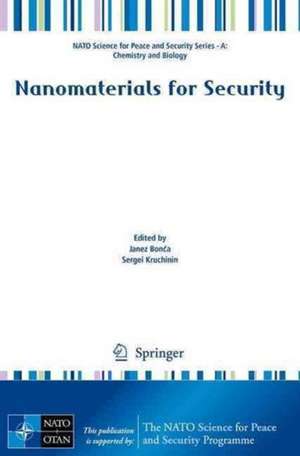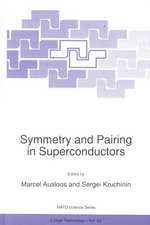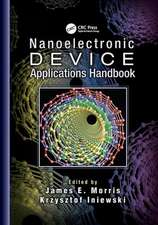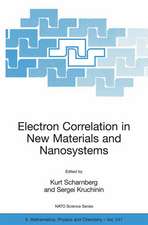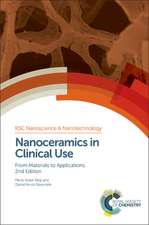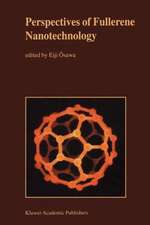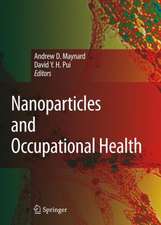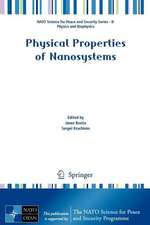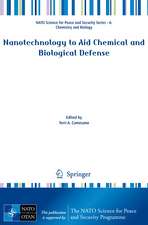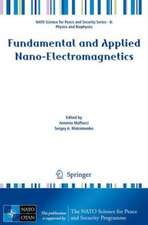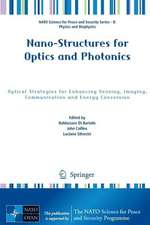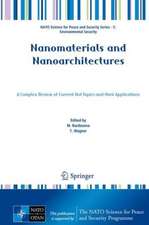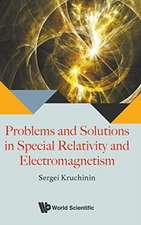Nanomaterials for Security: NATO Science for Peace and Security Series A: Chemistry and Biology
Editat de Janez Bonča, Sergei Kruchininen Limba Engleză Paperback – 7 sep 2016
| Toate formatele și edițiile | Preț | Express |
|---|---|---|
| Paperback (1) | 789.19 lei 38-44 zile | |
| SPRINGER NETHERLANDS – 7 sep 2016 | 789.19 lei 38-44 zile | |
| Hardback (1) | 801.79 lei 38-44 zile | |
| SPRINGER NETHERLANDS – 22 iul 2016 | 801.79 lei 38-44 zile |
Din seria NATO Science for Peace and Security Series A: Chemistry and Biology
- 18%
 Preț: 963.29 lei
Preț: 963.29 lei - 18%
 Preț: 1386.17 lei
Preț: 1386.17 lei - 18%
 Preț: 956.33 lei
Preț: 956.33 lei - 24%
 Preț: 789.19 lei
Preț: 789.19 lei - 15%
 Preț: 640.55 lei
Preț: 640.55 lei - 18%
 Preț: 1229.10 lei
Preț: 1229.10 lei - 15%
 Preț: 637.46 lei
Preț: 637.46 lei - 15%
 Preț: 645.28 lei
Preț: 645.28 lei - 15%
 Preț: 652.64 lei
Preț: 652.64 lei - 18%
 Preț: 949.90 lei
Preț: 949.90 lei - 5%
 Preț: 993.41 lei
Preț: 993.41 lei - 5%
 Preț: 1417.38 lei
Preț: 1417.38 lei - 18%
 Preț: 1220.45 lei
Preț: 1220.45 lei - 18%
 Preț: 944.82 lei
Preț: 944.82 lei - 18%
 Preț: 945.30 lei
Preț: 945.30 lei - 15%
 Preț: 634.00 lei
Preț: 634.00 lei - 18%
 Preț: 941.05 lei
Preț: 941.05 lei - 18%
 Preț: 1224.36 lei
Preț: 1224.36 lei - 18%
 Preț: 1220.45 lei
Preț: 1220.45 lei - 18%
 Preț: 1222.01 lei
Preț: 1222.01 lei - 15%
 Preț: 653.65 lei
Preț: 653.65 lei - 18%
 Preț: 942.63 lei
Preț: 942.63 lei - 18%
 Preț: 941.68 lei
Preț: 941.68 lei - 18%
 Preț: 1226.73 lei
Preț: 1226.73 lei - 15%
 Preț: 640.06 lei
Preț: 640.06 lei - 18%
 Preț: 1230.35 lei
Preț: 1230.35 lei - 5%
 Preț: 1419.76 lei
Preț: 1419.76 lei - 18%
 Preț: 1223.74 lei
Preț: 1223.74 lei - 5%
 Preț: 1094.60 lei
Preț: 1094.60 lei - 18%
 Preț: 1230.03 lei
Preț: 1230.03 lei
Preț: 789.19 lei
Preț vechi: 1038.41 lei
-24% Nou
Puncte Express: 1184
Preț estimativ în valută:
151.01€ • 157.67$ • 124.98£
151.01€ • 157.67$ • 124.98£
Carte tipărită la comandă
Livrare economică 01-07 aprilie
Preluare comenzi: 021 569.72.76
Specificații
ISBN-13: 9789401775946
ISBN-10: 940177594X
Pagini: 350
Ilustrații: XIX, 330 p. 190 illus., 109 illus. in color.
Dimensiuni: 155 x 235 mm
Ediția:1st ed. 2016
Editura: SPRINGER NETHERLANDS
Colecția Springer
Seria NATO Science for Peace and Security Series A: Chemistry and Biology
Locul publicării:Dordrecht, Netherlands
ISBN-10: 940177594X
Pagini: 350
Ilustrații: XIX, 330 p. 190 illus., 109 illus. in color.
Dimensiuni: 155 x 235 mm
Ediția:1st ed. 2016
Editura: SPRINGER NETHERLANDS
Colecția Springer
Seria NATO Science for Peace and Security Series A: Chemistry and Biology
Locul publicării:Dordrecht, Netherlands
Cuprins
Part I Nanomaterials.- 1. Atomic Collapse in Graphene.- 2. Fluorination Clusters on Graphene Resolved by Conductive AFM.- 3. Spin Relaxation in GaAs Based Quantum Dots for Security and Quantum Information Processing Applications.- 4. Very Sensitive Nanocalorimetry of Small Mass Systems and Glassy Materials.- 5. Phase Conversion of Y-Ba-Cu-O Thin Films by Super-Oxygenation and Cu-Enrichment.- 6. Strong-Coupling Diagram Technique for Strong Electron Correlations.- 7. Spin-Dependent Transport of Carbon Nanotubes with Chromium Atoms.- 8. Cell Monolayer Functioning Detection Based on Quantum Polarization Effects in Langmuir-Blodgett Multi-Walled Carbon Nanotubes Films.- 9. Magnetic Properties of Cobalt and Nitrogen Co-Modified Titanium Dioxide Nanocomposites.- Physical Properties of (As2Se3)1-x:Snx and(As4S3Se3)1-x:Snx Glasses.- 11. Thermal Memory and Thermal Induced Phase Transformation in Shape Memory Alloys.- 12. Spectroscopic Properties of Nanoceria Allowing Visualization of its Antioxidant Action.- 13. Vibration Based Microstructure Replication and Analysis.- Part II Nanosensors.- Nanotechnology and Microfluidics Based Biosensing.- 15. Resistivity Sensors of Metal Oxides with Metal Nanoparticles as Catalysts.- 16. Iono-Electronic Interface Based on Innovative Low Temperature Zeolite Coated NMOS (Circuits) for Bio-Nanosensor Manufacture.- 17. SQUID Detectors for Non-Destructive Evaluation in Industry.- 18. Morphological Features of Nanostructured Sensor for X-Ray and Optical imaging, Based on Nonideal Heterojunction.- 19. Hetero-Carbon Nanostructures as the Effective Sensors in Security Systems.- 20. Characterization of SnO2 Sensors Nanomaterials by Polarization Modulation Method.- 21. Diagnostic of Resonant Properties of Au-PTFE Nanostructures for Sensor Applications.- 22. Metal Oxide Based Biosensors for the Detection of Dangerous Biological Compounds.- 23. Cerium Dioxide (Ceo2-x) and Orthovanadate (Gd0.9Eu0.1VO4) Nanoparticles for Protection of Living Body from X-Ray induced Damage.- 24. Anthology and Genesis of Nanodimensional Objects and GM Food as the Threats for Human Security.- 25. Transmission of Three Resistance Sensor Signals over Four Wire Line with Losses.
Textul de pe ultima copertă
This book comprises 25 contributions focussed on nanotechnology for sensor applications. They stem from presentations at the NATO Advanced Research Workshop "Nanomaterials for Security". The chapters cover a broad but interrelated range of topics, including nanophysics, nanotechnology, nanomaterials, sensors, biosensor security systems, and explosive detection. They reflect many significant advances over the past two years as well as some entirely new directions of research that are just beginning to be explored.
